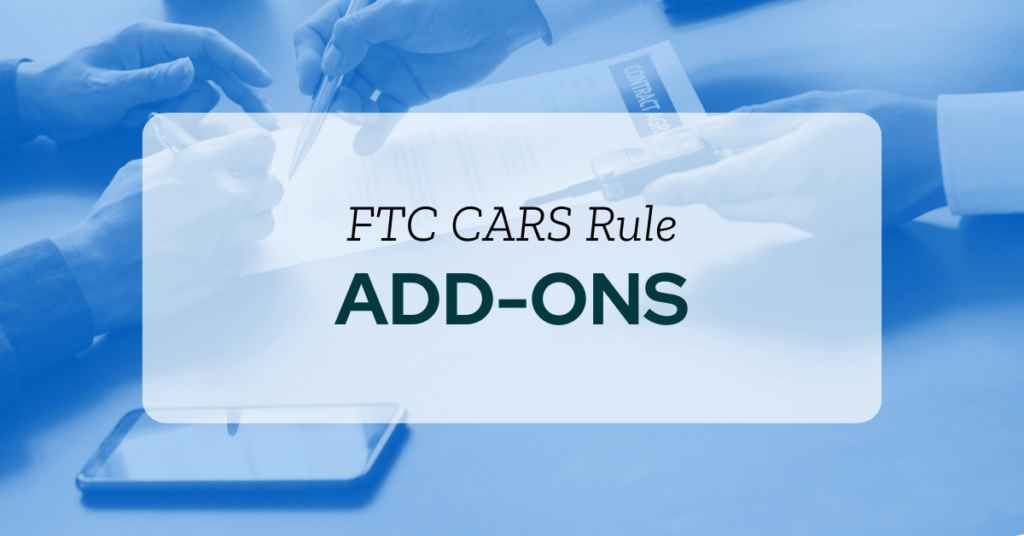The FTC’s newly announced Combatting Auto Retail Scams Rule (or CARS Rule for short) has been a hot topic for dealers since it was announced in December. The CARS Rule will have a profound impact on dealership advertising, sales, and financing strategies prior to its effective date of July 30, 2024. KPA’s putting together a series of articles to help dealers educate themselves on the do’s and don’t of CARS Rule compliance. One of the four pillars of the CARS Rule (or, as we like to jokingly refer to them, the four horsemen of the apocalypse) the FTC is keeping an eye on add-on products.
We’ve been following the CARS Rule closely since it was first proposed. Here’s what you need to know.
What the FTC says about Add-Ons
According to the FTC, “Under the CARS Rule, a dealer may not charge for an add-on product or service if the consumer wouldn’t benefit from it.”
An add-on product cannot be presented to a customer unless it is disclosed that it is not required for purchasing or leasing the vehicle, and cannot be sold without the express, informed consent of the customer.
What’s considered an add-on?
Add-on products that do not benefit customers cannot be offered. Add-on products or services are ones that are not provided to the consumer or installed on the vehicle by the vehicle manufacturer that the dealer, directly or indirectly, charges a consumer.
The FTC notes a pretty egregious one…“Examples include charges for “nitrogen-filled tires” that contain no more nitrogen that naturally exists in the air.”
But a more common add-on would be a service contract that duplicates the existing warranty coverage and Guaranteed Asset Protection (GAP) when the loan-to-value ratio would not result in a benefit.
If the add-on product would benefit the customer, it would need to be disclosed to the customer that the add-on product is not required and that the customer can purchase or lease the vehicle without the add-on product.
In order to sell the add-on product requires two more things:
- additional disclosures about the add-on product’s pricing, and
- the “express, informed consent” of the customer to purchase the add-on product.
The add-on product’s pricing disclosure must include
- what the charge is for, and
- the amount of the charge, including all fees and costs to be charged to the customer over the period of repayment (with and without the product or service).
Express informed consent requires more than just a signed or initial document, a prechecked box, or an agreement obtained through a practice designed to impair or remove choice; it requires an interactive process with the customer.
Stay on the Right Side of the CARS Rule with Help from KPA
KPA has been working on its CARS Rule Solution ever since the proposed rule was first announced, and is the ONLY solution offering:
- Professional and automated website scans to help find and remediate violations of CARS, TILA, Reg M, Reg Z, and more, before vehicle delivery
- Remote and onsite deal jacket auditing
- Employee CARS Rule training, along with other advertising, sales, and F&I trainings
- Employee Assessments
- CARS Policies
- Consumer Complaint Management System
- Electronic archive for sales and marketing materials
We’ve been providing advertising, sales, and F&I solutions for over a decade, and KPA’s CARS Solution will help you navigate and comply with CARS well before July 30, 2024.
Stay on the Right Side of the CARS Rule with Help from KPA
KPA has been working on its CARS Rule Solution ever since the proposed rule was first announced, and is the ONLY solution offering:
- Professional and automated website scans to help find and remediate violations of CARS, TILA, Reg M, Reg Z, and more, before vehicle delivery
- Remote and onsite deal jacket auditing
- Employee CARS Rule training, along with other advertising, sales, and F&I trainings
- Employee Assessments
- CARS Policies
- Consumer Complaint Management System
- Electronic archive for sales and marketing materials
We’ve been providing advertising, sales, and F&I solutions for over a decade, and KPA’s CARS Solution will help you navigate and comply with CARS well before July 30, 2024.
Subscribe to the Blog:
Get Best Practices in Your Inbox
Get tips, tools, and articles sent to your inbox weekly.

